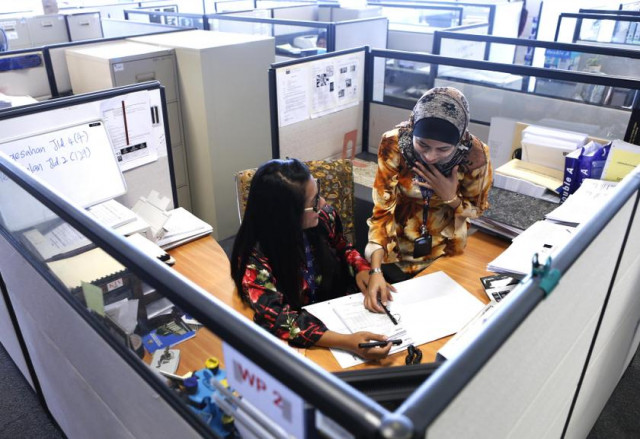7% women have access to financial services
Shamshad Akhtar says women need to be given access to money, bank accounts and credit

Representational image. PHOTO: REUTERS
While speaking at a session titled ‘Economic Empowerment of Women’ at the 1st Women Conference held on Friday, she stressed that the most important thing one should keep in mind while talking about economic empowerment of women is that it is an outcome of massive investments on women capital in sectors like health and education.
“We need to have an open liberal attitude towards women’s economic empowerment,” she added.
The former caretaker finance minister highlighted that the economic empowerment of women comes when financially inclusive policies are adopted.
“A financially inclusive policy means giving women access to money, bank accounts, credit; giving them the freedom to save and to keep their money in their own hands,” stated Shamshad.
She mentioned that the World Bank and the Asian Development Bank (ADB) were working to promote women’s access to credit, as credit will empower women to utilise money.
The economist underlined that currently, only 7% of women in Pakistan have access to financial inclusion services, out of the total female population of over 49%.
“Unless we change this number, we won’t be able to achieve economic empowerment of women,” she declared. “I believe that we need to see the economic empowerment of women and financial inclusion holistically.”
The economist pinpointed that economic empowerment programmes for women are only 1% of the total economic empowerment programmes that are happening in Pakistan.
“Between 1% and 7% we haven’t started the game to lift our women,” she remarked.
Meanwhile, Ahmed Jalal, who was moderating the panel, said that microfinance on its own is not a solution. He said, “Giving money is not enough, unless capacity building for women and leadership confidence isn’t there, and if these two aren’t done then they won’t be able to create value for the money they have been provided.”
He stressed on financial inclusion coupled with capacity building for empowering women economically.
Shamshad was of the view that investment in women is very important, “First of all we need to invest in female education because the female literacy rate is very low. Unless we don’t invest in women, we can’t bring in a sea change in the country.”
She proclaimed that the countries that have progressed are the ones whose women progressed first.
Moreover, she pinpointed that lack of economic empowerment of women is not just a problem in Pakistan, it is also a problem in other countries; one of them being Japan.
She said that to curb this female labour force participation should be ensured for which women should be provided space in the public sector, they should be given equal employment opportunities, and dedicated programmes should be organised for them.
She said that cumulatively, in Pakistan, only 2% of women are part of the corporate boards. “We need to change our legal and regulatory framework, furthermore, we need to do make certain actions compulsory so that our private and public sectors are forced to change the game and ultimately bring women to it.”
Adding further she said, “The problem in Pakistan is that we are caught between the federation and the provinces, because of which we haven’t invested in sustainable development goals.”
The economist stressed that there was a need to reduce poverty as that can help address issues faced by the women because “disproportionately women ratio is more in poverty ranks as compared to men”.
Published in The Express Tribune, March 7th, 2020.
Like Business on Facebook, follow @TribuneBiz on Twitter to stay informed and join in the conversation.



















COMMENTS
Comments are moderated and generally will be posted if they are on-topic and not abusive.
For more information, please see our Comments FAQ